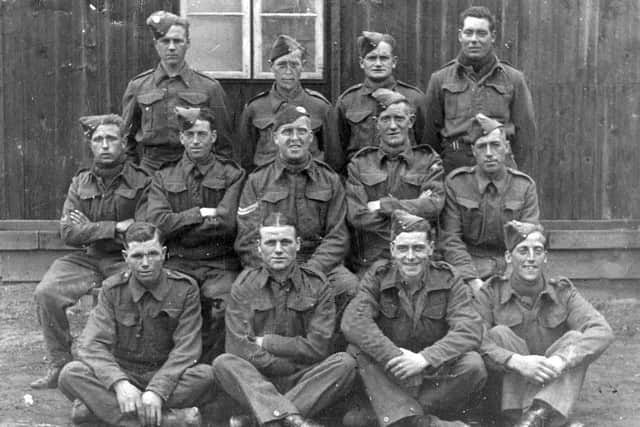The Nostalgia column with Margaret Watson: Prisoner of war rekindled love on his return home


One of these was Dennis Tolson, of whom I wrote recently, whose family had been told he had been killed when in fact he was a prisoner of war.
The same happened in the case of William Henry Gledhill, of Batley Carr, who spent four years in prison camps in Norway and Poland.
Advertisement
Hide AdAdvertisement
Hide AdHis parents and girlfriend, Doris Wilson, of Earlsheaton, had been told he was missing presumed dead, and for a year heard nothing more.


They believed he was dead, and Doris eventually married someone else, but the marriage was short-lived and the couple split up shortly after.
Four years later when William came home, the couple renewed their courtship and were married at Dewsbury Register Office.
One of their daughters, Julie Smith, of Mirfield, told me of their story some 20 years ago, but I re-tell it again because it is a story of love, courage and hope – something we all need to read about during these difficult times.
Advertisement
Hide AdAdvertisement
Hide AdJulie had always been intrigued by her parent’s love story and believed strongly that they had always been meant for each other.
It was a year after he had been reported “missing presumed dead” that his family received the joyous news from the Red Cross that he was alive.
But they had to wait another three years before they would see him again, and tragically, his father, who had been ill for a long time and had been hanging on to see his son, died on the day before he was due to return home.
William, a regular soldier, had joined the Army four years before the start of the Second World War and fought in the war with the KOYLI regiment.
Advertisement
Hide AdAdvertisement
Hide AdAs a regular soldier he had served all over the world, including a spell in the Spanish Civil War.
But when the Second World War broke out, he was posted to Norway where he was captured.
Although he used to tell his sons what had happened to him, he never told them he had received the Military Medal for outstanding bravery.
The family knew nothing about this until after he died when a friend, who had served in the same regiment, told them.
Advertisement
Hide AdAdvertisement
Hide AdTwo of William’s sons followed him into the Army – Billy, who was injured twice while serving in Ireland with the Green Jackets, and Christopher, who did three tours of duty in Ireland.
William was sent to four different prison camps, and while in Poland was sent to work down the mines.
His son, Billy, said: “Dad used to tell us how they were moved from one camp to another, and had to make the journey from Norway to Poland by foot in the freezing cold. Dad saw a lot of his friends die.”
Julie believed that not even the war and the terrible suffering her father had endured could destroy the love her parents had for each other.
Advertisement
Hide AdAdvertisement
Hide AdShe said: “Dad was mum’s first love. They met in Dewsbury while walking on the Prom, and I believe they were always meant for each other. They were wonderful parents – we couldn’t have had better.”
After the war, William became a painter and decorator, and the couple got a little one-up-one-down house on the Eightlands, and later moved to a council house on the Mountain Estate in Thornhill.
William never talked to his daughters about the war, only to his wife and sons, but Julie always sensed how much he had suffered at the hands of his captors.
“Some nights he’d have terrible nightmares. I can remember as a child lying in bed and hearing him shouting and screaming in his sleep.
Advertisement
Hide AdAdvertisement
Hide Ad“Mother told us some of the things that happened to him, and how he’d once saved a prisoner who was dying of hypothermia. He used his own body heat to keep him alive.
“Dad was very good looking, and mother was always proud of him. She left instructions that when she died we had to play “Love is a Many Splendoured Thing”, at her funeral.
William died when he was 69 and Doris when she was 82, and the couple were always warmly remembered by their large family and many friends.
There are many stories like this which occurred during the war but the men involved rarely spoke of them.
Advertisement
Hide AdAdvertisement
Hide AdFor this reason I will continue to tell their stories through their families and loved ones while ever I am writing this column.
People of my generation, and the one before, who experienced what it was like during the war, will not be around forever, and who will be there to tell the story when we have gone?
We have films and books telling us how it started, how it ended and a great deal about what happened in between.
But there are still many stories to be told about ordinary people, and I hope their families out there will continue to let me know.
Just as Dennis Tolson’s son, Roger, told me about his dad, and William’s family told me about theirs.
Send your memories of bygone days in Dewsbury to [email protected].